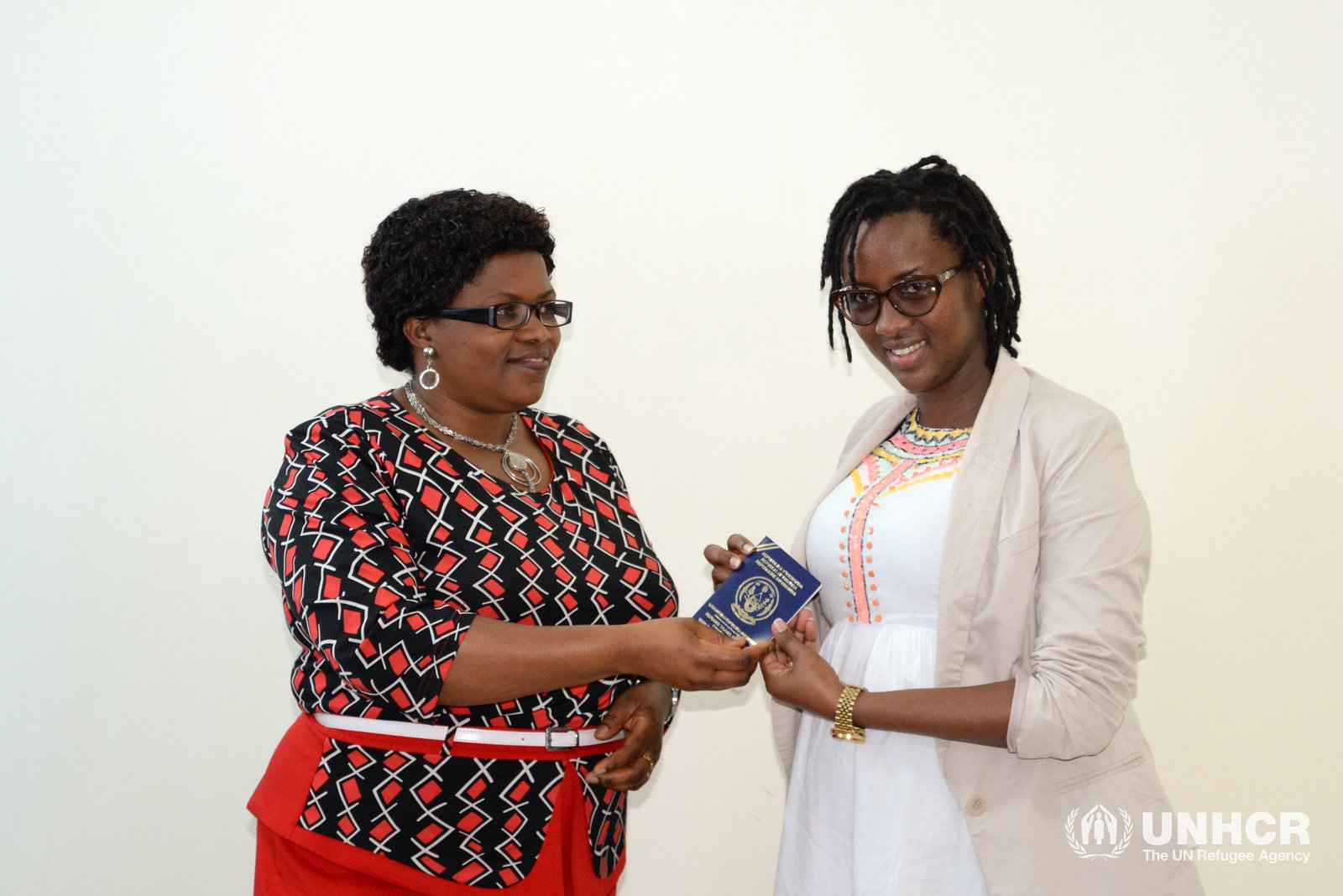The Government of Rwanda and the UN Refugee Agency launch the issuance of Machine Readable Refugee Travel Documents

The Government of Rwanda and the UN Refugee Agency launch the issuance of Machine Readable Refugee Travel Documents
The Government of Rwanda through the Directorate General of Immigration and Emigration (DGIE) and the Ministry of Disaster Management and Refugees (MIDIMAR) together with the UN Refugee Agency (UNHCR) have launched the issuance of Machine Readable Convention Travel Documents for refugees hosted in Rwanda. The launching event was held at Kacyiru at the Headquarters of the Directorate General of Immigration and Emigration at 11:00 am.
The issuance of Machine Readable Convention Travel Documents is in line with the 1951 Geneva Convention on Refugees ratified by the Government of Rwanda in 1979, and in compliance with standards of the International Civil Aviation Organization (ICAO) and the recommendations made in May 2014 recommendations by the ICAO Technical Advisory Group on Machine Readable Travel Documents.
The refugee travel document was first issued by the Rwanda Government to Burundian refugees during 1972/1973. This travel document was issued in accordance to the Convention of 28 July1951. This was during the pre-colonial and post-colonial period, when Burundi was colonized by Belgian Government and happened that the civil war broke up between ethnic groups in Burundi thus moved to neighboring countries including Rwanda. It was issued to Burundian refugees for purposes family reunification, resettlement and other different reasons.
The current Conventional Travel Document in use has been issued to refugees since 2004. It is a blank booklet manually filled. It was provided by UNHCR to Member State parties to the 1951 Convention, particularly those in the developing world. This document was produced in Geneva- Switzerland until recently.
Since the beginning of October 2018, it is issued to refugees by the Directorate General of Immigration and Emigration (DGIE) in collaboration with the UNHCR. The new refugee travel documents are available to eligible refugees hosted in Rwanda.
The Machine Readable Refugee Travel Document includes personal data and photo of the refugee and a machine readable zone to conform to ICAO standards.
The launch today consisted in delivering Refugee Travel Documents to those refugees who have applied for them – their objective being to travel abroad.
The Government of Rwanda is also issuing refugee ID cards to refugees who are 16 years and above and to those whose card expired. This follows on the four Ccommitment made at the 2016 Leaders’ Summit on Refugees by the Government of Rwanda which consist in delivering valid refugee cards to refugees .
The launch was attended by the Hon. Minister of MIDIMAR, Director General (DG) DGIE and UNHCR Country Representative in Rwanda.
The Minister of Disaster Management and Refugees, Mme DE BONHEUR Jeanne d’Arc in her remarks emphasized that the issuance of Refugee Travel Documents will positively impact refugees’ daily lives and freedom of movements.
“One of the fundamental rights of refugees is the right of free movement in different countries except their country of origin. The Government of Rwanda committed to make sure that hosted refugees get access to legal documents which will facilitate them to have access to different services including safe and free cross border movement,” said the Minister.
The Director General of Immigration and Emigration, Mr. Anaclet KALIBATA in his remarks indicated that this is an important achievement in the history of issuance of travel documents in Rwanda. The Government of the Rwanda working with UN Refugee Agency is able to produce and issue Refugee Travel Documents to refugees which are machine readable at an affordable price.
UNHCR Representative to Rwanda, Mr. Ahmed Baba Fall commended the extent to which the Government of Rwanda is fulfilling its commitments and for its continuous support to refugees. He underlines that such travel documents will have an important impact on the life of refugees seeking to do gainful activities across the borders such as business, study, medical treatment or family reunification. He also encouraged refugees to make the best use out in order to enhance their living conditions.
Currently, Rwanda hosts about 150,604 refugees and 5,293 asylum-seekers, mainly from the DRC and Burundi.




